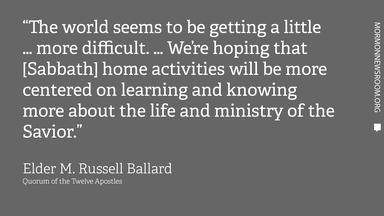A recent Deseret News-sponsored poll reports that only half of U.S. adults say the Sabbath has personal spiritual meaning for them (down 24 points since 1978), yet only 11 percent disagree with the idea that society benefits from people taking a day off for spiritual rest. Repose, it seems, is slowly being divorced from spirituality.

Additional findings from this poll, as well as commentary from journalists, religious leaders and others, argue that a Sabbath sans religion matters because it signals the continued secularization of America, an eventual exhaustion of a people always at work and a creeping disconnection from community.
The ‘de-Christianization of America’
Orthodox Christian and conservative columnist Rod Dreher says the decline in Sabbath observance is “part of the de-Christianization of America.” By denying the value of a Sabbath, he says:
We unavoidably deny that there’s anything sacred about time. Or, to be precise, we affirm, whether we want to or not, that we, not the God of the Bible, are the sovereigns of our own lives, and have the right to pick and choose what it means to be faithful. Sabbath worship is absolutely integral to Christianity. … Whether you want it to or not, this habit — or lack of a habit — will erase the memory of Christianity from yourself and your family. This is the risk you take by making Sabbath church going optional. Choices have consequences.
Latter-day Saint leaders had similar concerns when, in April 2015, they began instructing members to observe the Sabbath with greater purpose.
“We felt that it was urgent that we strengthen the faith of our people,” said Elder M. Russell Ballard of the Quorum of the Twelve Apostles. “The world seems to be getting a little … more difficult. … We’re hoping that home activities will be more centered on learning and knowing more about the life and ministry of the Savior.”

On the bridge to burnout
According to the Deseret News study, many say a day off is strictly for them — to relax and run errands rather than pursue religious commitments. Only 27 percent of respondents list church attendance as a Sabbath activity, while even fewer read a religious text (13 percent) or engage in religious meditation (11 percent). What’s more, 18 percent of millennials work at a full- or part-time job on the Sabbath, compared to 12 percent of those in Generation X.
In his 2011 book, “The Gift of Rest,” former US Sen. Joe Lieberman, a practicing Jew, said we live in a busy world where “people are desperately in need of rest—not just rest to recharge our batteries so we can work harder but to recharge our souls so we can live better.”[1]
President Russell M. Nelson of the Quorum of the Twelve Apostles introduced the Church’s renewed emphasis on Sabbath observance by noting that “God gave us this special day … for a rest from duty, with physical and spiritual relief. In Hebrew, the word Sabbath means ‘rest.’”
But what of those who are confident they can will their way into a successful day of rest, without religion? Naomi Schaefer Riley of the New York Post, writing about how to rest in a post-religion era, notes that although many who aren’t religious try to unplug and take a break, "it takes some willpower [without religion]. It’s extraordinarily difficult for many of us to put away our devices for an hour, let alone a day. Indeed, one advantage of a religious Sabbath over a self-imposed one is that a higher power is holding you to it."
A diminishing community ethic
Perhaps the most concerning finding from the Deseret News poll is that only 40 percent use the Sabbath to visit friends and family, signaling a departure from one of organized religion’s greatest strengths: community.
Deseret News national editor Allison Pond says this stat surprised her most because, as she told “On Religion” columnist Terry Mattingly, "Americans keep saying that they want friends and community, but the whole 'bowling alone'[2] phenomenon is out there and it's growing.”
The Sabbath lives of many Latter-day Saints tap into a community ethic. One Mormon mother recently described her Sabbath experience as “enjoying our time with each other and friends, eating, telling stories, playing games and watching old home videos from when my children were little.” And another member wrote that instead of pursuing self-focused materialistic ideals on the Sabbath, he chooses to make it a day to, among other things, “serve others.”
Community matters because, as a Russian novelist wrote, “a man's true security lies not in his own solitary effort, but in the general wholeness of humanity.”[3] For Latter-day Saints, the individual journey of spirituality is inseparable from family and the larger community of fellow members, who gather weekly for worship and meet monthly to fellowship and assess needs of assigned families. And the Mormon ethic of community doesn’t stop there—as founder Joseph Smith said, the Latter-day Saint charitable impulse “ranges through the whole world, anxious to bless the whole human race.”
[1] Joe Lieberman, The Gift of Rest: Rediscovering the Beauty of the Sabbath, 227.
[2] “Bowling Alone” is a phrase from sociologist Robert D. Putnam’s book of the same name about the collapse and revival of community in America. “Once we bowled in leagues, usually after work—but no longer,” the book says.
[3] Fyodor Dostoevsky, The Brothers Karamazov, 304.